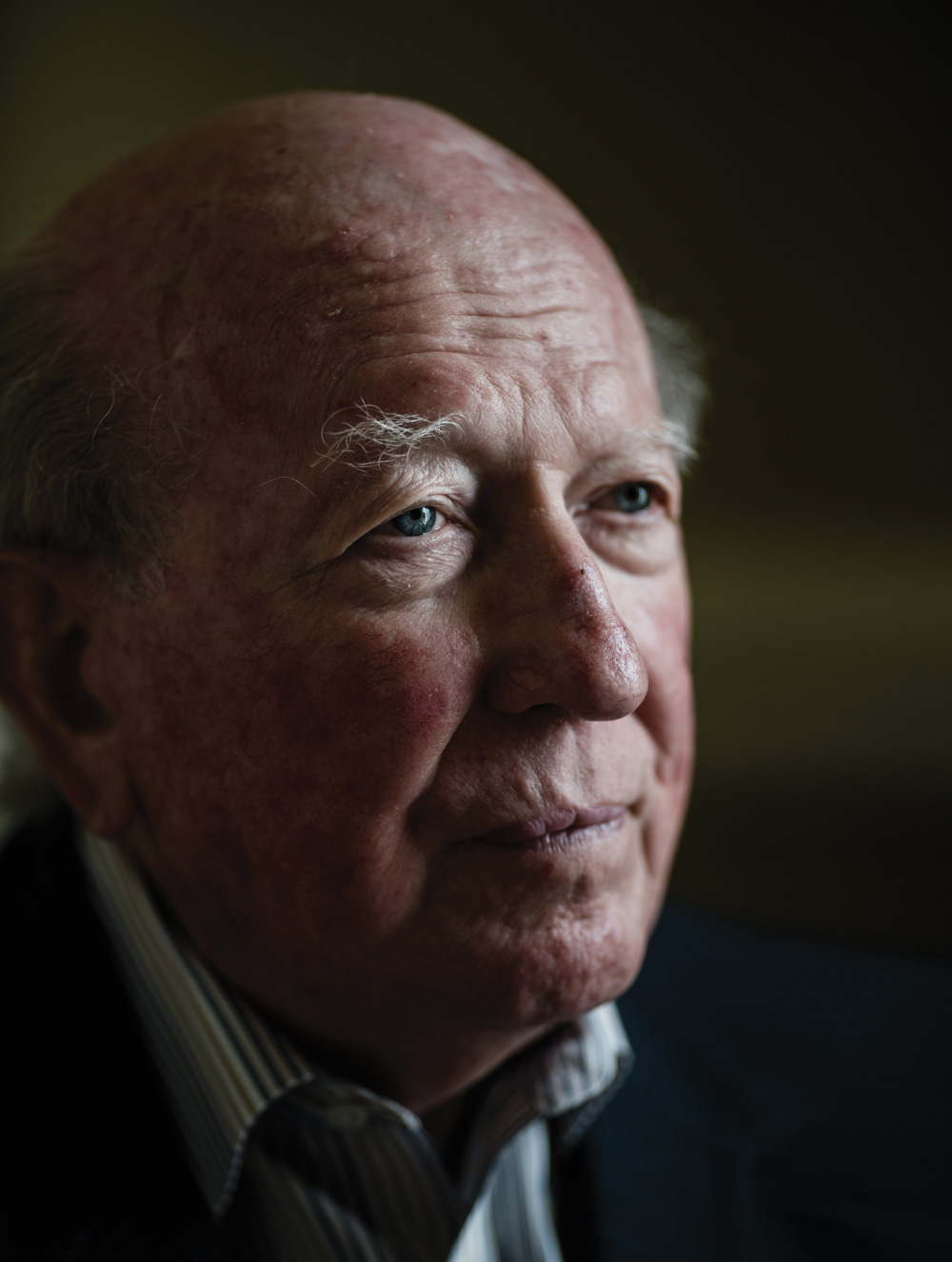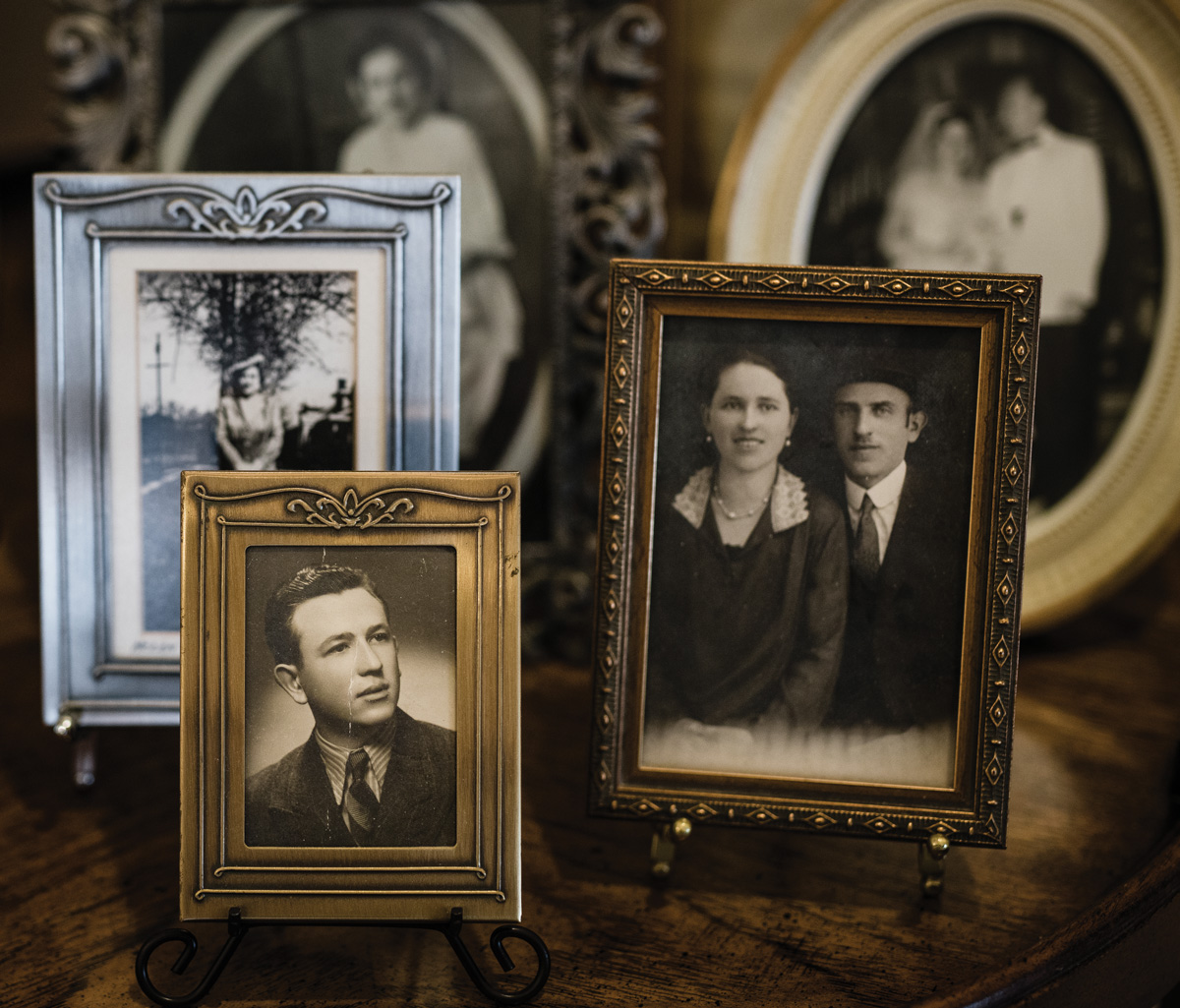
Photograph by Raymond McCrea Jones
There is no telling how many more times Murray Lynn can do this—stand before a few hundred people and speak of it again. His father’s murder. His mother’s rape. The train to Auschwitz. His three brothers, all killed, along with his widowed mother. And Murray himself, at 14 years old, the lone survivor.
There is no telling how many more times he can do this because he is 86 years old, and though his mind and spirit are strong, they are no match for time. How many Holocaust survivors who are still alive in the U.S. is a matter of some debate—one estimate puts them at 100,000—but one fact about them is inarguable: They are dying off in greater numbers each year. Within a decade, it will be a rarity to find one who can personalize humanity’s darkest chapter, who can say they saw it with their own eyes, the way that Murray Lynn is doing on this Sunday afternoon at the William Breman Jewish Heritage Museum on Spring Street.
Murray approaches the podium and arranges several sheets torn from a yellow legal pad. A yellow tie pops against the dark of his suit. He adjusts the microphone, and it comes loose from its clip, and someone helps him reposition it. Murray chuckles and then takes a breath.
My narrative has a universal message. It transcends race, creed, religion, and national boundaries because it chronicles the consequences of unchecked and unprecedented religious bigotry, which led to a tidal wave of bloodshed unrivaled in the annals of human history.
Too many church and lay leaders remained willfully silent and willfully blind when we were herded like sheep to the slaughterhouse. Pious proclamations and platitudes of love, brotherhood, and forgiveness did not apply to Jews. We were thrown to the wolves, and they had a feast. We were maligned, marginalized, and persecuted not because we were evil, but because evil was seen in us because we differed in our faith.
Seventy years later after the bloodshed, after the bloodiest war in history, the world has not reformed itself. The past is not dead; it’s not even the past. Antisemitism is a growing and threatening menace. To stem the tide, we need a unified voice and collective action from church and lay leaders to denounce and condemn the ubiquitous drumbeat of religious bigotry.
Murray sits down, and his face appears on a video screen. Unconquered is a 37-minute documentary that serves two purposes: It memorializes his story, and, during an engagement like today’s at the Breman, it spares him the agony of recounting the details of each incomprehensible loss he suffered during World War II.
Murray was the oldest of four boys, born Moshe Leicht to Rosa and Abraham Leicht, in Bilke, Hungary. In the early 1940s, the Arrow Cross party was ascendant. Like their counterparts in Nazi Germany, the Arrow Cross were fascists who espoused racial purity and targeted minorities, especially Jews. Late one night in 1942, two officers knocked on the door of the Leicht home and took away Abraham. Two weeks later the family heard that he and 15 other Jewish leaders in the community were shot after being forced to dig their own mass grave.
Some time after that, there was another knock at the door. This time it was an Arrow Cross soldier who’d come to rape Murray’s mother. Her oldest son resisted, and the soldier threatened to shoot him if he didn’t stop.
In April of 1944 the deportation of Hungary’s 800,000 Jews began with Arrow Cross soldiers forcing families from their homes and marching them to the train station. From there, Murray, his three brothers, and their mother were sent to a ghetto, but within a few days they were crammed into a cattle car with other Jews and sent to Auschwitz. The journey took 72 hours. There were no stops, no food.
At Auschwitz a prisoner advised Murray to tell the Nazis he was 16, not 14. It meant he was marked not for immediate death in the gas chambers but for labor. Within an hour, he asked a fellow inmate where his mother and three younger brothers might be. The man pointed to the smokestacks, belching the ashes of the dead.

Photograph by Raymond McCrea Jones
When the documentary is over, Murray returns to the podium.
Auschwitz tested a thousand times the limits of human endurance and our resilience in the face of relentless savagery and cringing servitude. What kept madness at bay was our fervent faith and blind hope for messianic redemption.
Over 70 years later the sights and sounds of these nightmares continue to invade my life and dreams. As my wife will tell you, she wakes me up periodically at night from my screaming. On a tranquil evening when the clouds are clear and the moon high, I can still see the silhouettes of limping and grotesque skeletons marching. And I can still hear the nightly wailing and shrill echoes of pleadings to the heavens for divine intervention.
My life was shaped by the crashing waves of history. It was tempered and honed in the crucible of Auschwitz. It defines what I am and who I am. For three memorable years after my liberation, I was alone and homeless, marching and meandering across Europe’s scarred and poverty-stricken wasteland in search of a better life. It took guile, grit, and uncommon resourcefulness to navigate through the gales and shoals of an inhospitable continent. My odyssey ended at the age of 19, when I came to New York.
Inclusion and not exclusion is the hallmark of a free society. We must do much, much more to level the playing field for all Americans, irrespective of race, irrespective of color and creed or national origins. Inequities breed resentment, violence, and radicalism in all forms, including revolutions. In my native country, I was viewed and portrayed as a Jew first and perhaps a flawed human being second. It was next to impossible to rise above the station in life into which you were born. This must never, ever happen in America the beautiful.
My generation is old and gray, hobbled by the ravages of aging and battered by haunting memories of a lost world. The curtain is rapidly descending on our last act. The future belongs to you. I’ll leave it to you to see whether your generation will tame the savages of man, secure a more enduring peace and greater justice for the powerless and oppressed than did the world of my generation.
Next event
Murray Lynn’s talk is part of the “Bearing Witness” series at the Breman. The next, on May 7, features Dr. Eugene Schoenfeld, a survivor of Nazi death camps. The program is free and open to the public. The documentary on Lynn’s journey is available at thebreman.org. Search for Murray Lynn.
This article originally appeared in our May 2017 issue.











